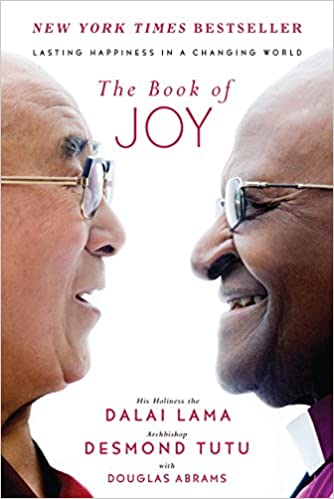The Book of Joy — Book Summary
Introduction
The Book of Joy is a self-help book with a difference. Recorded over the space of a week, Douglas Abrams was privileged to sit next to two of the world's most respected men, His Holiness the Dalai Lama and Archbishop Desmond Tutu. What progressed was a never held conversation before about joy and its roots.
Thought these are two men with entirely different religious beliefs, opinions, and indeed experiences, their unique friendship, and respect for one another are as beautiful as the very concept of the book itself.
Offering their take on how they manage to find joy even in a world as troublesome and as frightening as the one we all inhabit today, their reasoning is simple – yet their response for the reader is one that will last a lifetime, and long after reading this book.
Interesting quotes from the book
The more time you spend thinking about yourself, the more suffering you will experience.
— Dalai Lama, The Book of Joy
The three factors that seem to have the greatest influence on increasing our happiness are our ability to reframe our situation more positively, our ability to experience gratitude, and our choice to be kind and generous.
— Dalai Lama, The Book of Joy
There are going to be frustrations in life. The question is not: How do I escape? It is: How can I use this as something positive?
— Dalai Lama, The Book of Joy
Summary of the book The Book of Joy
The emphasis of The Book of Joy lies in the understanding that yes, the world may be a difficult place for many of us. There may be suffering and despair. However, it is still possible to find joy in it, whether that be by way of love, friendship, family, or even in those small things that make us smile and laugh.
Above all, the discussion here relies not on individual faiths or beliefs, which both men make noticeably clear at the start. Instead, the conversation steers around what the Dalai Lama and Archbishop have witnessed over many years and continue to do so. But they persist in approaching all those around them and such circumstances with hope. Most importantly, they undertake their roles with an element of joy.
One of the crucial takeaways of this book is the notion that there will most certainly be tragedy and, indeed, pain, grief, and hurt in all our lives. Yet, we can choose to dwell on such incidents, or we can succumb to the notion that when there is nothing more we can do about them. By accepting such situations that are out of our control, we can allow ourselves to be free. Only then can we welcome a sense of joy into our lives.
Nowhere is the message of this book clearer than in the conversation about the media. Desmond Tutu sums this up, and the whole point of the book, in one thought. He admits that many depressing incidents are happening in the world. However, as the Dalai Lama will also testify to, there are also many good things happening too. Unfortunately, it is those good things that are not considered newsworthy and do not make our papers, magazines, and screens. But it is, therefore, in our power to seek out such events, however small they may be.
Review of the book The Book of Joy
The Book of Joy is a heartwarming book and one so beautifully written. With the idea of every one of us being able to discover joy in some way, shape, or form in our lives, it not only carries with it a strong message – but above all makes you smile throughout every page!
Having heard much about these great men, but not really knowing nothing more than their public persona, I felt as though I was invited to the very room with front row seats to be part of this most magical of conversations!
The warmth radiating from this book is beyond words, and the little snippets of their jokes and jests offer the most personal element into their lives. But, perhaps most importantly, it strengthens each man's case for how easy it is to let joy into our lives – and all we need to do is be willing to accept it.
The message of this book is evident from its very first page. But what perhaps stands out more is the apparent respect, and indeed friendship that these two wonderful men possess. Despite their experience, own personal tragedy, and heartache, they strive for all of us to experience joy; and listening to them, you can't help but feel won over by their words.
I especially love the concept that all the money in the world, status, and material things mean nothing if joy can't be found from one person alone. That is, all the looking outward will do nothing if we can't look inwards to find inner peace and a sense of happiness. Through the book does, in many ways, re-iterate much of what we may already know. However, it does a better job of encouraging us to put actions into place.
Above all, The Book of Joy works on the fascinating areas of spiritualism and science combined, rather than religion. This combination makes it a universal book and one that has something for everyone.
An emphasis on allowing love and joy to win over hate and despair. An intensely friendly and intelligent conversation between two most distinguished men. A book that doesn't judge or preach and is open to interpretation by all faiths. Most importantly, this is a book whose words will never date.
There really is nothing to fault in The Book of Joy! With the principle message of compassion and empathy and finding a way that is filled with hope for each one of us, I can't imagine many people finding anything wrong with this book.
Conclusion
The Book of Joy works so well by encouraging us to open up and get our thoughts and feelings into a sense of proportion. It nudges us to realize that there are ultimately some things that are beyond our control. Yet, these things need not require us to spend so much time fretting over them, considering that we can never change them.
Ultimately, it emphasizes how we, as human beings need to allow ourselves the right to be happy – only then can we begin to find real joy. And, as these two wonderful men say, there is so much joy to be had in the world.
The Book of Joy never at any time preaches. Neither does it offer immediate solutions. But what it concentrates its efforts on is reminding us that we are all in this together, and there are indeed many ways to find joy. That is, no matter how small or fleeting they may be - a message which was never needed so severely than right now in 2020.
The Book of Joy can help you learn how to be happier.
Don't miss the other book summaries on SunInMe.org

